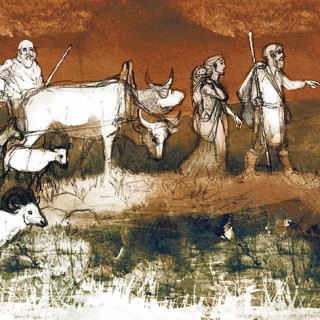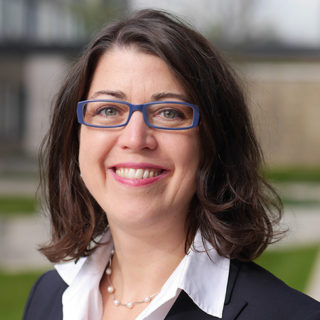Climate change causes migration
How does weather and climate variability affect the Middle East in regards to migration, decarbonisation, and food security? Postdoc and lecturer Lina Eklund at Lund University sheds light on the complexities of the region and how projects are making a difference.
“Climate variability, drought for example, is nothing new or unexpected for the Middle East. The long-standing relationships between people and the land in this region are very complex”, begins Lina.
WHILE CLIMATE CHANGE has forced some people to migrate from rural agricultural areas to urban areas, this alone is not the cause of migration. Lina explains:
“Few Iraqi Kurdistan citizens leave rural areas due to agricultural drought; rather, most people migrate for other reasons, such as political or financial. Conflict has even caused some citizens to leave cities and seek safety in more rural areas”, Lina says, and continues:
“Migration or displacement due to climate change can be difficult to pinpoint, and can be used as a scapegoat for governments. Many Syrian citizens rely heavily on agriculture and are vulnerable to climate change, but the reason they migrate might be insufficient policies or governmental support”.
MANY PARTS OF THE MIDDLE EAST also rely heavily on the drilling for, and production and export of fossil fuels. Oil supplies provide the region with economic stability, jobs, and trading leverage.
“This reliance and interconnectedness makes reducing emissions and decarbonising economies in the Middle East very difficult”, explains Lina.
“Climate change is generally viewed as a ‘luxury problem”
The Middle East faces other obstacles as well, including a lack of government incentives to reduce emissions, scarce or unreliable public transportation, cheap vehicles and the perception of environmental problems as non-urgent.
“With politics, conflict resolution, or economic well-being often being the top priorities for people in the Middle East, climate change is generally viewed as a ‘luxury problem”, adds Lina.
Some of Lina’s recent research focuses on food and agricultural independence, analysing government support in the Middle East.
“The Iraqi Kurdistan government wants increased food sovereignty, productivity, and local agriculture, so we will be using satellite images to monitor changes”, says Lina. “The Middle East relies heavily on profits from the fossil fuel industry to pay for imported food, and this makes the region vulnerable to food insecurity” adds Lina.
“THESE REGIONS HAVE SIMILAR CLIMATE CHANGE and precipitation, so comparing their agricultural trends and differences can show how governmental support is influencing farming practices”, says Lina.
While the Middle East faces numerous political, agricultural, economic, and environmental challenges, there are regional projects which are having positive impacts. Lina mentions roof-top farming in Palestine as one success story.
“Fruit that is often imported to this region can be very expensive; this project allows people to produce fruit locally and strengthen food security. This project is also providing young generations with skills and empowering local women, who are in charge of the roof-top farming”, says Lina.
Iraq is also repairing important marshlands that were previously destroyed and drained prior to 2003.
Lina adds: “Marshes that served as bird sanctuaries and food sources for fishermen are being restored, and people are returning to these areas”. There is even a growing bicycle initiative in Syria that is managed by local youth. “Streets and roads are being damaged and destroyed due to the ongoing civil conflict, so driving is difficult and biking has become an easier alternative way to travel. Many more bicycles are now being sold in the region,” explains Lina.
“ECONOMIC STABILITY, human well-being, and food security are often prioritised above climate change. Other regions have more capacity and resources to focus on mitigating and adapting to climate change”, says Lina.
The various examples of local initiatives display that even in areas with numerous challenges, people can still succeed in combatting climate change while simultaneously helping their communities.
Text: Jack Fraser who is a current MSc student studying Environmental Management and Policy at Lund University IIIEE. He is also a journalist for Sustainability Forum http://www.sustainability.lu.se/






